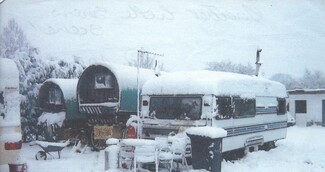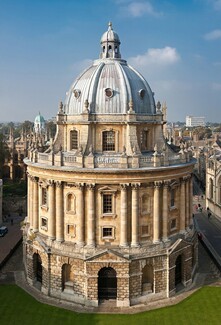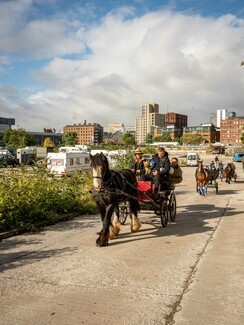'Come Write Me Down' - three poems by David Morley

the Romani poet and academic David Morley has given the Travellers' Times permission to publish three of his poems; one based on a song performed 1906 by Betsy Smith, the Romany Gypsy singer; the next about Lil-Engreskey Grav (Oxford); and the final one about an unfortunate lecture on the Romani language that David once gave.
Are any of our readers related to Betsy Smith?
after a Romany song performed by Betsy Smith, 1906
I have a diamond in my eye
and no care in the world despite you.
I’ll give you gold and all my pearls
for the Romany families freezing
from dewfall until evening
on their Oxfordshire Traveller sites
in Redbridge Hollow, and Oakley,
at Standlake and Woodhill Lane.
Come write me down, said the singer,
come write me down.
It’s not your gold or pearls, my love.
I have no need of either
as I unroll your moneyed mind
and find no heart for your being kind
to the Romany children freezing
from moonrise until morning
on their English Traveller sites
with no water, heat, or light.
Come write me down, said the singer,
Come write me down.
Redbridge Hollow, Oakley Wood, Standlake and Woodhill Lane are Traveller sites in Oxfordshire. Some lines are adapted from a song ‘O write me down the powers above’ performed by the Traveller Betsy Smith in Creech St. Michael in Somerset on 9 August 1906.

A Town Made of Books
The Romany name for Oxford is Lil-Engreskey Gav. For Travellers it means two things at the same time: a town made from books and a town made of readers.
I love the Dr Seussness of a town built from books.
The spires dreaming on slabs of OEDs
tapering as they scale the skies
in step-gables of print and paper size.
Hardbacks heaped up as wall stones
for Merton and Magdalen Colleges.
A million unread Georgian poetry anthologies
tottering to the pinnacle of Tom Tower.
Fine print crenelations of Radcliffe Camera.
Oxford commas pouring from word clouds.
Oxford sentences clogging the plumbing
under St Giles, Cornmarket, and Carfax.
Chained books in special collections,
filing their manacles like Magwitches.
And the pubs, their doors propped wide
with entries into the pages of heaven.
Romany reads you like a book.
Its tongues are twinned and twined.
The language rainbows
and unrainbows speech.
Lil-Engreskey Gav also means
a town made of readers, or for them,
of flesh and blood buildings domed and doored
by a Sheldon, an Ashmole, a Pitt Rivers.
Cold colleges hewn from Purbeck
and granite. Fledgling scholars
flittering like verbs through quads
in their noun-dark cloths of night and light
chiselling into prose the texts of their tombs
in an entry inside a dictionary.
And at dusk the sherry of short story.
The high table of the novel and supper of RP.
Lil-Engreskey Gav conjures a ghost-sense too:
a mortar of love, a bond that binds
those college walls, roots the buildings:
carves words written and read into life,
worlds-in-telling, adoration of their magic,
a gift that holds an edifice aloft,
makes a library a love affair,
leaves a reader alight with lore,
the words now reading them in turn
into souls of light, storied structures,
highest windows, flown buttresses,
singing belltowers, dreamed spires.
Gentiles and gentle readers,
Romany reads them like a book.
Its tongues are twined and twinned.
They rainbow and unrainbow speech.
Gentiles is an old Anglo Romany Traveller term for non-Gypsies.

Storytelling
At an academic conference I gave a paper
on Romany language. I spoke of the leopard-leap
of its dialects from branch to branch
of Sanskrit, Anglo-Saxon, and Romance.
The open purse of gold of Romany loan words
both given and received in kind, or kindness.
The caravan trails of its tongue across continents,
its mouth wide to the tides and shoals of speech.
How fleet of foot the words needed to be
in their quicksilver changeling disguises.
Why nouns grew spring-heeled with meaning
and verbs vroomed off, words which Travellers
might ride on, or hide behind from hard law,
gadjos, or the poisoned pens of parliament.
I spoke all this poetic stuff as prose.
Then I leaned out of art and said, ‘My friends,
when police come for Travellers, we move on.
Language shows who we are, and it is better
to be invisible. But spoken language moves
like meltwater under ice. Speech thaws into life’.
There was cold applause. A door whined open.
Catering trundled in, clattering trays
to hurry us along to Q&A.
A young lecturer raised his hand, saying:
What is the point of listening to this trash?
Nobody spoke or spoke up. Tea was served.
All three poems by David Morley, and published by the Travellers' Times with his kind permission.
David Morley is an award-winning poet and an academic, of Romani heritage. David's most recent published work was Fury.
(Lead photograph: Ryalla Duffy, with permission from daughter Verity Duffy)